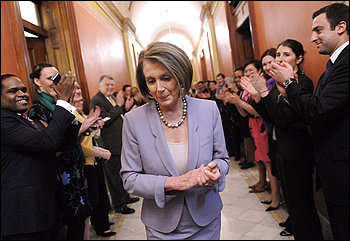
“Members of this Shadow Congress — not all of whom are registered lobbyists — hail from 41 of 50 states (Texas has the most, with 17) and they’re almost as likely to be Democrats as Republicans. Some, like Tom Daschle and Bob Dole, were powerful congressional leaders, whose presence on K Street has drawn scrutiny in the past. But far more are low-profile back-benchers we’d never heard of and we doubt you had either:“
TPM’s Justin Elliot and Zachary Roth try to ascertain a head-count of the representatives from K-Street: “We’ve compiled a close-to-comprehensive list of former members of Congress currently working on behalf of private interests in Washington’s influence-peddling industry. We count 172 of them — almost one-third the number of current members of Congress.” (They deem them the “Shadow Congress,” but I think that name is, quite frankly, far too awesome to be used in reference to a bunch of bought-and-paid-for-lobbyists. See also: Shadow Broker, Shadow Proclamation, etc. etc.)
The picture above, by the way, is Joseph Keppler’s The Bosses of the Senate, from the January 1889 issue of Puck. Consider also David Graham Phillips’ “Treason of the Senate” from 1906, and the problem of corporate control over our republican institutions is sadly not-so-new. But back then, alas, they were just getting warmed up.




